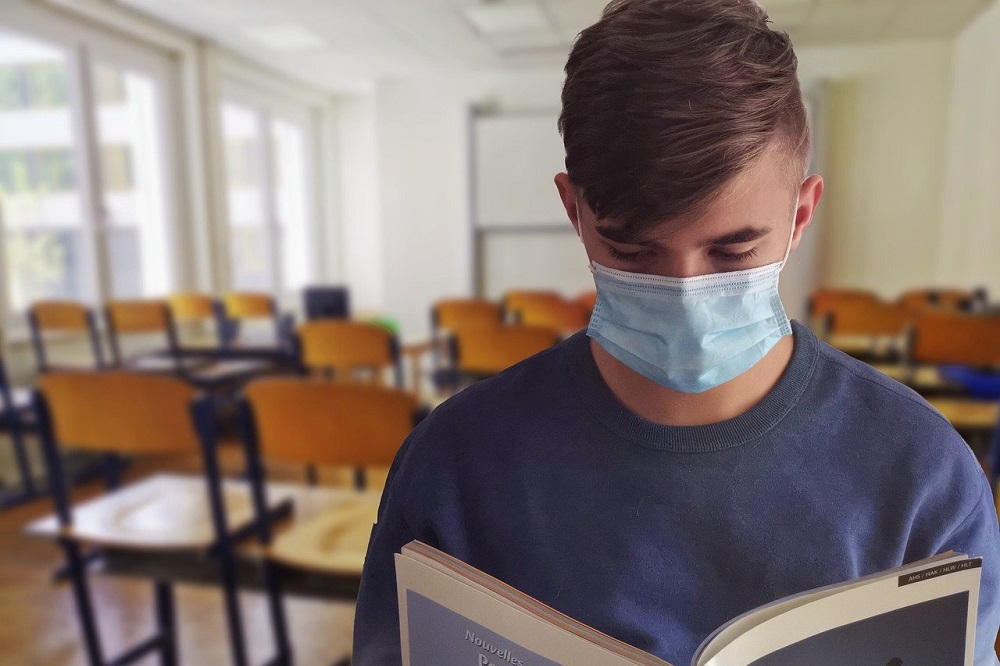Face masks ‘make wearers look more attractive’, Cardiff University study suggests

Face masks make wearers look more attractive, according to a Cardiff University study.
Discussions about face coverings have raged during the pandemic, but the reasons for masking up may not just be medical.
The study, published in the journal Cognitive Research: Principles and Implications, measured how different types of face masks changed the attractiveness of 40 male faces.
They discovered the type of covering matters – blue medical masks were found to increase facial attractiveness more than other types of masks.
Dr Michael Lewis, a Reader from Cardiff University’s School of Psychology and an expert in the psychology of faces, said: “Research carried out before the pandemic found medical face masks reduce attractiveness – so we wanted to test whether this had changed since face coverings became ubiquitous and understand whether the type of mask had any effect.
“Our study suggests faces are considered most attractive when covered by medical face masks. This may be because we’re used to healthcare workers wearing blue masks and now we associate these with people in caring or medical professions. At a time when we feel vulnerable, we may find the wearing of medical masks reassuring and so feel more positive towards the wearer.
“We also found faces are considered significantly more attractive when covered by cloth masks than when not covered. Some of this effect may be a result of being able to hide undesirable features in the lower part of the face – but this effect was present for both less attractive and more attractive people.”
‘Participants’
In the study, 43 female participants rated the attractiveness of images of male faces without a mask; wearing a cloth mask; a blue medical face mask and holding a plain black book covering the area a face mask would hide, on a scale of one to 10.
The research was conducted in February 2021, seven months after face masks became mandatory in the UK.
“The results run counter to the pre-pandemic research* where it was thought masks made people think about disease and the person should be avoided,” said Dr Lewis.
“The current research shows the pandemic has changed our psychology in how we perceive the wearers of masks. When we see someone wearing a mask we no longer think ‘that person has a disease, I need to stay away’.
“This relates to evolutionary psychology and why we select the partners we do. Disease and evidence of disease can play a big role in mate selection – previously any cues to disease would be a big turn off. Now we can observe a shift in our psychology such that face masks are no longer acting as a contamination cue.”
Further work is being conducted with female and male participants.
Support our Nation today
For the price of a cup of coffee a month you can help us create an independent, not-for-profit, national news service for the people of Wales, by the people of Wales.






Have they nothing better to do?
Lets stick to the medical case for face masks shall we – not drivel like this and its superficial notions about ‘attractiveness’. When they’ve finished messing about perhaps the boffins at Cardiff university’s Psychology school could do a serious study on mask wearing and the communication difficulties it can sometimes cause those of us who are hearing impaired? And – with the pandemic not showing any signs of going away and mask wearing in public settings set to remain for the forseeable future – how the communication difficulties mask wearing sometimes causes for the hearing impaired can be overcome?
What a load of nonsense. I barely leave the house now and never after dark. One of the reasons is because I feel threatened when I see people in masks, especially men. I usually end up crossing the street to try to avoid coming close. I’m sure many muggers and other criminals are rejoicing in how they have become more difficult to identify due to these atrocious masks.